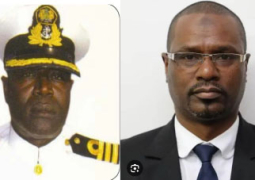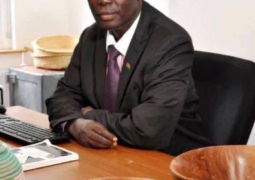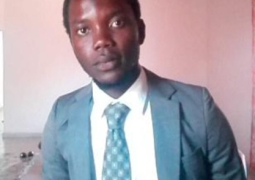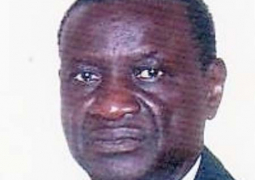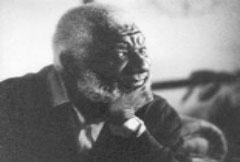
(Speech delivered by Dr Lenrie Peters in 1980, and published inPrésenceAfricaine Special Edition, 1st Colloquium of the 3rd World Festival of Negro Arts (FESTAC): The World Dimension of Black Peoples, Conference of Ministers for Culture of the Black World, Dakar, 17-18 December1980. pp. 53-56)
Africa lies at the solar plexus of the world geographically and in terms of world events. In recent centuries, many devastating blows have been aimed at her emasculated visage, at her raw nerve centre. Her peoples have been enslaved, her culture ravaged, her resources exploited, and they continue to be so exploited. And now, her reticulated territories, slashed about by the rapaciousness of foreign interests and interventions, crawl forward into the dawn of the 21st century, manacled by manifold restraints.
Yet we know that on this continent occurred that subtle and magnificent evolution from ape to man, from Zanthropitheus Africanus to Homo Sapiens. Here on this continent, first emerged that spark of energy, resource, intellect – that spirit we call “human civilization”. I invite you to take cognizance of this fact.
I invite you to ask yourselves: What went wrong along the way? If, over the millennia, out of this human cradle in Central-Southern Africa evolved the great human civilizations – Chinese, Indian, Byzantine, Mediterranean, European and now the Techno-European – what mutation, what aberration has connived to leave the black race out of this grand reckoning?
Having absorbed this crucial and uncomfortable reality into your systems, let me now invite you into the destiny of the future. Men of colour everywhere, let me invite you to the glorious burial of all that is embodied in the neurosis of blackness. Allow me to invite you to purge yourselves of all concepts of inferiority, of the notion of domination; to disavow the acceptance of non-acceptance of your culture. To seize again the initiations which determine your destiny, as you once embodied the biological and evolutionary conceptions.
I invite you to establish yourselves once again at the centre of the world stage: that stage erected and conceptualized by Kwame Nkrumah. That stage brilliantly illuminated, and its intricacies revealed by Frantz Fanon. That stage on which the choreography of Césaire, Damas and Senghor traces large and strong. The stage on which, determined and alone, hammering away at disassociated fragments of raw words, stands Nyerere.
These men need not have laboured in vain. But to stand shoulder to shoulder, we must both recognise and respect our common destiny. We must close our ranks against the incendiary winds of foreign dissention. We must share the pain of each man’s aching heart. We must guard ourselves against false friends, ingratiating friends, adulatory friends, lethal friends. Inevitably, we must depend on ourselves and on ourselves alone.
It seems to me lunacy that we should expect (or believe in their pledges) that the United States, Britain, France or the U.S.S.R. should genuinely want to help us achieve economic parity or political equality. Not even if all the Messiahs were to come down and implore them. And why should they?
It is up to us to seize the initiative, determine priorities, work out contingency plans and act upon them. Too often we wait to be led, to be told what to do. We must assassinate, once and for all, the mentality of going cap in hand for assistance around the globe. The Colossus we call the United States of America was not created by experts and World Bank loans but by a determined and deprived people who, finding their backs against the wall, had the ruthless vision of hard work and the sense to get Africans to do it for them. By contrast we find, in every corner of Africa, experts vaulting against each other; some doing little more than cast our best loans to the winds.
We must review our entire aid-accepting strategy. Men of colour must seek to establish a collective identity. One of self-understanding, deeper even than religious affiliation for religion has often been used to divide and plague us. The recent experience of Uganda exemplifies this point. But I hasten to add (lest misunderstandings engulf us) that I am not arguing to deny any individual or group its right to religious belief and practice. I am only eager to emphasize that we must at all times be aware that religion can be used as a destructive and divisive medium to our cause; that, given the Africans’ natural and instinctive surrender to religious belief, perhaps we can explore even deeper levels of experience at which we can identify.
I am inviting you to turn your backs on the old and battered attitudes of looking at the black problem in terms of the outside world. The words “colonialism” and “neo-colonialism” suggest men at the ramparts searching the horizon for an elusive enemy, real or imagined. No! Let us approach the problem for a change by looking within ourselves; within the structure of our society, with our own potential, for the answers we seek.
What has occurred during the change from traditional society to a modern State which weakens the fabric of the structure? Why are we continually faced with crises of leadership? Can we identify the causes? These are sociological problems to be analysed scientifically. These are questions which we must face squarely ourselves and work out solutions. They are not matters for foreign experts. They are problems which require the concerted efforts of black men of goodwill everywhere: from presidents and governments, academics, factory workers and even the toilers in the field. But the answers will not spring out of a Pandora’s Box – the search will be tedious and unending.
At this moment in time, there is in process an accretion of Great Power interests. The Great Powers are coming together and consolidating their already vast advances on the economic, political, diplomatic and strategic fronts. The Arabs at least have oil as a basis for co-operation. What of Africa and the Black World? We remain divided and suspicious of each other, and each decade sees the wedge driven deeper. Africa constitutes at this moment the most helpless and vulnerable land mass on this earth, riddled with spy satellites and nuclear satellites. I am not of course including South Africa in my scale of reference. India and Pakistan are technologically advanced to the point of having a nuclear potential.
I beg of you, as you drive home in your air-conditioned Benzes and Peugeots, to realize how singularly backward we are technologically as a people.
Let us begin with self-awareness. Let us begin by transfusing the O.A.U. with new policies, new objectives, new ideas. Let Heads of State learn to disagree in private and stop hanging out their filthy linen for the foreign press. Let each member-country establish an O.A.U. section within its Ministry for External Affairs where research and thinking in depth can be sustained. Let our academics stay at their universities, research into our problems, write books and cease being trajectories in the sky. Let there be accelerated a rich exchange of experience and learning between people of the black experience. Let us teach the psychology of emancipation in our schools. We need to have our French-speaking brothers inside the O.A.U. for it to have the image of African solidarity.
It is time that political leaders recognized the full value and functions of writers and artists within their communities if we are not to produce sterile societies, faceless societies from which the well-famed joy of life of the black race has been crushed, even eliminated. “Doers” and “thinkers” must work together to fashion a healthy, integrated, impregnated mesh of social conscience. In this new atmosphere, writers and artists will flourish on African soil, will meet each other on a regular basis, will have a point of view, will be spared the indignity of rummaging abroad for patronizing conferences and seminars. Then, the innumerable barriers of language will be breached, barriers between State and State, between town and country, between system and system, between men and women. Then perhaps the day will finally dawn when black people in a white world will become less conspicuous by their expatriated differences.
But time, Ladies and Gentlemen, is against us.
…………………………………………….
Profile of a Gambian Writer
A FATE OF AN AFRICAN PRESIDENT by Fodeh BALDEH
Published in 1996 by Fulladu Publishing Company of Nuskka, Nigeria, this 69-page collection presents 39 poems by Fodeh Baldeh, all of which are dedicated to the author’s unfortunate experience after the events of July 1981. At the time of the attempted coup, Fodeh Baldeh, who was a teacher at Gambia College (Yundum), was called upon by the mutineers to translate a communiqué into French and read it on the radio. This act was subsequently considered proof of complicity with the mutineers and Fodeh Baldeh was arrested on 30 August 1981 and imprisoned for eleven months. It is therefore understandable that this collection of poems could not be published until after the political changes of July 1994, fifteen years after their production, and that an external venue, Nigeria, was preferred for publication.
In his preface, Fodeh Baldeh recalls the circumstances of his incarceration and explains how he was able to write in Mille II prison, which at the time was overcrowded with accused coup plotters. Resentment, the feeling of injustice, the critical judgement of the political regime of that time and its functioning, prison life and the humiliation suffered because of the conditions of detention, the disapproval of the Senegalese intervention, the recourse to God, the yearning to see his relatives who were not allowed to meet him, the friendship of a woman, constitute the main themes of this collection. But it is also an opportunity for the author to meditate on national unity and the meaning of Gambian identity. And although this collection was not published until long after the failure of the Senegambian federation, it is, along with Gabriel Roberts’ The Goosieganderan Myth (1988), Sheriff Sarr’s Meet me in Conakry (1984) and even Ebou Dibba’s Chaff on the Wind (1986), among the texts written during this period: they all exalt Gambian national sentiment (‘Awake people of Gambia’, ‘Deadly Masks’) in reaction to the misbegotten attempt to confederate. Many of the poems also reflect on freedom (‘Freedom is dead’, ‘Freedom and Captivity’, ‘Gateway to freedom’) and on a better model of society (‘Rebirth’).
The very act of writing, that is becoming aware of his situation and expressing it in the form of poems, was for Fodeh Baldeh a crucial fact and, one could say, a first mental liberation before the actual liberation of his physical being: “In poetry I ‘m able / To pour out my feelings / Without fear or favour and feel with words / The way into the tunnel” (from “I do not know”). Fodeh Baldeh, who is also the author of several books on the English language and the founder of Fulladu Publishers, gives poetic writing its full meaning and strength: no frills, no verbal outbursts, but simple and direct words to express this experience of suffering, a phrase of blood on these “petals of justice”.
First published by Professor Jean-Dominic Penel in the Daily Observer, 8 October 2001.
…………………..
Poetry corner
Hassan I Jagne
Save The Children
Yesterday a car hit little Fanny in front of her school
Her little satchel lying beside her
The gentle morning wind
Blowing her tiny skirt into a ripple
As the horrified crowds gathered around.
They tear down the beautiful
Kairaba. Avenue
Lunatic fashion
As if fleeing from some perturbing pestilence.
The children are killed, like young Samba, fast
Drivers drive fast, too fast
Turn not, O turn not, the straight smooth
Avenue into a slaughter road and
Roll not up Atlantic Road to Westfield in a twinkle.
Wakeful traffic officers come and go
Do a fine job but needs must go
O where are these sleeping policeman?
They talk not, move not, car not and go not
You pay a heavy price for speeding over them.
African Twilight
Gallant sun has now completed his diurnal
Journey across the havens, or so it seems.
Dusk has come upon this part of the Earth,
And now a subdued glow hangs
Above the horizon in the occident.
Aquatic birds head for their nocturnal
Roost among some sea rocks
Or in some mangrove swamps,
While an old woman patiently gather faggots
For the cool evening fire.
It is a transitional period!
In the outskirts of the village
The serene evening
Is pierced through by the bleating
Of sheep reluctantly trudging
Their way to the fold
And the distant sound of pounding
Can now be heard,
As the zealous village women
Prepare the evening meal.
All nature
Is set for long rest,
Except the bat blind in daylight
But endowed with night sight
Ready to go for again.
In the kraal cattle calmly chew the cud
As the stalwart shepherd goes round milking.
Day is fast changing to night
And the owl will soon begin to hoot
Man must go to sleep
The night is for other breed.
The `Cacataar’ (Chameleon)
You have gone, and are now a rare jewel!
There was a time when even in the town
You could be seen taking your guarded
Slow steps along some `Kirinting’ fence,
What great fun we as children always had
When we discovered your unobtrusive presence
We would hang around enjoying
What we (uninformed) considered your
Practiced art of, in turn, assuming
The various colours of your dresses.
Never have you once disturbed anyone
But have been perturbed, banished
And relegated to beyond the outer
Confines of human settlements.
Your peaceful nature loathes intrusion
When modernization finally began
You were inordinately troubled.
Quiet, steady, even uncanny!
Often have we watched you yank your prey
Moving deliberately slow and lying motionless
You can with a sudden dart of your sticky tongue
Snatch the unwary fly some inches away,
I have yet to come by your habitat.
The belief is that it fetches fortune
If kept in a suitcase. I have moved one
Slow step forward – it looks like a stocking


